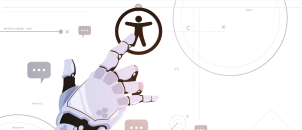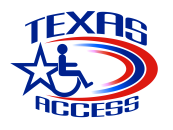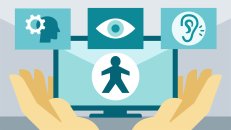Germany has two accessibility laws that ensure more inclusive, barrier-free access and they both cover digital accommodations.
Quick facts about the BITV (2.0)
What It Covers: Websites, mobile applications, electronically supported administrative processes, graphical program interface, etc.
Who Must Comply: Affects all German public bodies and federal agencies and vendors, contractors, and partners of those agencies.
Deadline: Public sector websites published before September 23, 2018, must comply by September 23, 2020, and mobile applications by June 23, 2021.
Any organization that fails to have Barrier-Free Information Technology could be open to lawsuits, financial liabilities, and damage to brand reputation.
According to Germany’s Federal Statistical Office (Destatis), by the end of 2017, 9.4% of Germany’s total population suffers from some type of disability.
Germany has two laws that cover digital accessibility:
- Equal Opportunity Act (Disability Equality Act – BGG)
- Barrierefreie-Informationstechnik-Verordnung (BITV 2.0)
Equal Opportunity Act (Disability Equality Act – BGG)
Germany’s proactive approach to serving individuals with disabilities was enacted on April 27th, 2002 through the Gesetz zur Gleichstellung von Menschen mit Behinderungen (Behindertengleichstellungsgesetz – BGG) or the Act on Equal Opportunities for Disabled Persons, also commonly known as Equal Opportunity Act (Disability Equality Act – BGG). The act serves as a non-discrimination law and was last amended by Article 3 of the Law on July 10, 2018. Like the Americans with Disabilities Act (ADA) in the U.S.A., the law seeks to eliminate discrimination against individuals with disabilities and ensure this category of people has equal rights and opportunities in participation as everyone else.
The Act on Equal Opportunities for Disabled Persons mandates that all its citizens with physical, hearing or mental impairments, speech disabilities and other types of disabilities must have access to goods and services such as means of transport, technical and non-technical commodities, sources of information and communication facilities without any barrier or difficulty.
Disability Equality Act – BGG falls directly on the federal government, including the federal bodies, institutions, and foundations of public law including those owned or funded by the federal government, subordinate to the federal government, controlled or appointed by the Confederation. Organizations and businesses that fall under these categories must provide an alternative (such as sign language or other suitable communication aids) and provide barrier-free information technology by designing their websites and mobile applications to be made accessible as far as possible. It also authorizes these organizations to publish a declaration on the accessibility of their websites or mobile applications and provide a report on the status of accessibility every three years, for the first time on June 30, 2021.
In a nutshell, the Act covers all aspects, from physical considerations to digital accommodations, thereby increasing equality and accessibility. Any organization that fails to have a Disability Equality Act-compliant website and mobile applications intended for public access could be open to lawsuits, financial liabilities, and of course, damage to brand reputation.
Barrierefreie-Informationstechnik-Verordnung (BITV 2.0) – Federal Ordinance on Barrier-Free Information Technology
Supporting Germany’s Federal Disabled Equalization Law (BGG), that is, the ordinance for the creation of barrier-free information technology according to the Disability Equality Act is Barrierefreie-Informationstechnik-Verordnung (BITV) 2.0 – the German regulation for accessible information technology.
The Barrier-Free Information Technology Ordinance (BITV) was issued on the basis of the disability discrimination act of 2002 by the German Ministry of Labor and Social Affairs and the Ministry of the Interior. requiring barrier-free information technology. The Ordinance moves to enable and guarantee comprehensive and unrestricted access and usage to the design of information and communication technology by people with all types of disabilities. BITV 1.0 was first issued on July 17, 2002, and was at the time, based on the World Wide Web Consortium’s (W3C) recommendation in 1999 known as Web Content Accessibility Guidelines (WCAG 1.0). The German accessibility policy at the time mandated websites and webpages be designed barrier-free and publicly accessible and stated that all sites must be accessible by December 31, 2005.
The Barrierefreie Informationstechnik-Verordnung Ordinance conformance requirements were refreshed and updated to BITV 2.0 on September 12, 2011, and was last amended by Article 1 of the Ordinance of May 21, 2019, and it adopts the most updated internationally recognized standards for accessible web content, the WCAG 2.0.
BITV 2.0, like Section 508 in the U.S.A., affects all German public bodies and federal agencies and vendors, contractors, and partners of those agencies by mandating them to ensure information and services that are made available electronically are accessible and usable by people with disabilities. It affects:
- websites
- mobile applications
- intranets, extranets
- electronically supported administrative processes, and
- graphical program interfaces – web-based and non-web-based applications.
In other words, agencies that work with or ever intend to work with the German government must ensure people with disabilities can access applications and services of information technology including online content.
Hence, the Equal Opportunity Act (Disability Equality Act – BGG) together with BITV 2.0, serves as the accessibility laws in Germany.
BITV 2.0, WCAG 2.0, and EN 301 549
Since BITV 2.0 is based on the WCAG 2.0 benchmark, websites and applications offered by German institutions must be designed in such a way that won’t restrict people with disabilities by being perceivable, operable, understandable, and robust for users of assistive technologies. It is also important to note that the European standard for barrier-free access to the websites and mobile applications of public authorities – EN 301 549 v2.1.2 also gave legal force to the W3C’s WCAG 2.1 AA guidelines and the EU Directive has been transposed into BITV 2.0 in accordance with the Equal Opportunity Act (Disability Equality Act – BGG), as required by the EU. The EU standard demands its transposition as the model for declaration of accessibility in an accessible and machine-readable format and its availability on the home page and every page of a website. The Directive also represents the requirements for laying down a website compliance monitoring methodology and reporting modalities.
In other words, the most updated BITV 2.0 implements the requirements of Directive (EU) 2016/2102 that were not already included in the updated Disability Equality Act (BGG) in 2018 i.e. the harmonized EU standards EN 301 549. Hence, websites that have been published since September 23, 2018, must put an accessibility declaration online by 23 September 2019 while older websites must publish their accessibility statement by September 23, 2020, and mobile applications by June 23, 2021, and they all must be updated annually.
Although the concept of WCAG 2.1 (A, AA, and AAA) conformity levels is not specifically adopted in the BITV 2.0, its reference to EN 301 549 has shown the German Federal Government’s commitment to achieving conformity level AA. One thing though, BITV 2.0 goes beyond WCAG 2.1 Level AA by mandating general explanations of content and navigation in German sign language and easy language, amongst other small differences in details.
Disability Equality Act – (BGG) and EN 301 549 Compliance
According to Germany’s Federal Statistical Office (Destatis), by the end of 2017, 9.4% of Germany’s total population suffers from some type of disability. Of the 7.8 million people in Germany living with disabilities, a large 61% suffer a form of physical impairment while about 12% have a form of mental disability. This is why it is important for German federal government websites to accommodate roughly 1 out of 10 people with disabilities without discriminating against disability type or gender through Federal Disabled Equalization Law Compliance.
Since compliance with federal law means compliance with BITV 2.0 and EN 301 549, it is mandatory for public agencies of the German government to provide accessible information technology through the Web Content Accessibility Guidelines (WCAG). You can go over a super-easy checklist in our dedicated WCAG article.
I’ll also recommend you perform an evaluation test to assess the accessibility of your individual web pages and the entire website, based on WCAG 2.1 AA in order to generate an accessibility statement according to the (EU) Directive.
Barrierefreie-Informationstechnik-Verordnung – BITV (2.0) Success Criteria
While the BITV requirements only apply to German federal government websites, the government does encourage state and local agencies and commercial providers to build websites, mobile applications, and services in a manner that is accessible. The BITV requirements have also spilled over to the private sector, with more and more clients being aware that inaccessible sites exclude customers and can cause negative press.
Digital accessibility is all about making sure all users have access to our content and providing reasonable accommodation for people with disabilities. Hence, responsive design is key which includes:
- Providing images with alt text (descriptions)
- Subtitles or transcripts for audio and videos
- Ensuring sufficient color contrast for text, and icons that are interactive or convey information
- Using informative descriptive link text
- Avoiding (or limiting the use of): auto-playing content and non-essential animation
- Including people with disabilities in usability testing
- Enabling keyboard navigation
- Using clear text: Use easy-to-read font
- Coding your content to be read by screen readers
- Documents and PDFs must be primed to be accessible
- Having each piece of Information once on the site
- Providing accurate headings
Ensuring the above WCAG 2.1 compliant features in your web design will be providing accessible information technology and compliance with Federal Disabled Equalization Law (BGG), Barrierefreie-Informationstechnik-Verordnung (BITV) 2.0, and WCAG 2.1 AA laws and guidelines.








